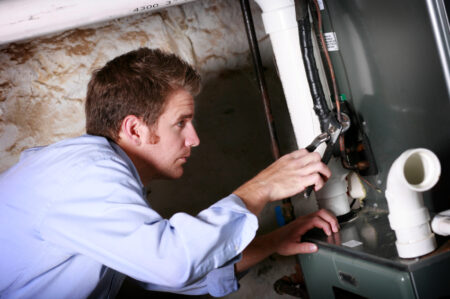
HVAC units get a workout in homes in the Central Illinois area, and people often worry about efficiency and cost with their systems running so much. If you’ve ever looked at the ratings for heating and air conditioning systems, then the SEER number was likely front and center. The SEER rating shows up on labels for HVAC units so that consumers can make apples-to-apples comparisons between systems. You may have questions about what the SEER number is and why it’s particularly important to folks who live in this part of Illinois. We have answers. Here’s what you need to know.
What Is SEER?
SEER is an acronym that stands for the seasonal energy efficiency ratio. Most HVAC contractors pronounce it like the word “sear,” like browning something quickly when you cook. Federal legislation from the 1980s required the implementation of a system for rating heating and cooling units for their overall energy efficiency. Several revisions have appeared during the intervening decades, with the most recent in 2023.
Understanding the SEER Rating
For the average consumer, the simple takeaway is that higher is always better. The original system required a SEER rating nationally of at least 10, and you pretty much should never see a system with a nine or lower. If you do see one with that kind of rating, then the system is so ancient that you should presume it needs to be replaced.
As the government revised the SEER rating, the number became slightly regionalized. Also, the government has raised the standard since its origin. Most areas in the northern part of the U.S. have rules that require a SEER rating of 14, and most areas in the South require a 15 rating. Illinois is a northern state so the required SEER rating here is 14.
You will sometimes see a SEER rating with a decimal. This is the SEER2 rating, arising from changes from 2023. The current SEER2 rating for the North is 13.40 and the rating for the South is 14.30.
As the efficiency of HVAC systems has improved, there have been newer systems appear that go well above the SEER baseline. It isn’t out of the norm now for some top-tier AC systems to have SEER ratings of 20.
Why the SEER Rating Matters Generally
SEER ratings are the starting point for choosing heating and air conditioning systems. Building codes start with the SEER rating in determining if an HVAC system is up to the job or not. Likewise, the SEER figure provides an agreed-upon way for homeowners, builders, and HVAC technicians to talk about what systems will go into a house. It also serves as a good quick reference whenever you’re buying or renovating a home. If you see a system with a rating below the current standard, then you can easily assume that the HVAC needs a replacement.
The SEER rating also matters to your pocketbook. Over time, a higher-SEER system will use less energy to do the same amount of heating and cooling. This is especially important in high-humidity areas because the cost of heating and cooling a cubic foot of humid air is noticeably higher. While dehumidifying the air helps, there is also a cost that comes with that during an air conditioning cycle. The added inefficiency isn’t great for the environment, either.
Why the SEER Rating Matters in Central Illinois
It would be an understatement to say that Central Illinois sees a wide range of weather. Folks who’ve lived here for any real time have seen everything from sub-zero winter storms to heat waves that went well over 100 degrees with close to 100 percent humidity. In other words, the efficiency of your home’s HVAC matters for different reasons at different times of the year. Regardless of your home’s energy source, heating it in the winter isn’t cheap. Likewise, surviving the worst part of summer requires the air conditioning system to crank sometimes all night.
Bratcher Heating & Air Conditioning, Inc. has helped many families in Central Illinois address their HVAC needs efficiently. From ac installation to heating installation, maintenance and more — our technicians have the necessary training to do the job well. Qualified customers can also finance service, and we frequently have specials. We even provide free estimates. If you wish to discuss the HVAC issues of a home in Central Illinois, contact Bratcher Heating & Air Conditioning, Inc. today to schedule a consultation.
